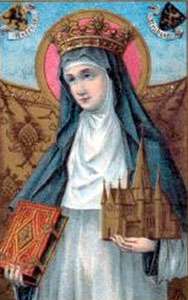Begga
Saint Begga (also Begue, Begge) (d 17 December 693 AD) was the daughter of Pepin of Landen, mayor of the palace of Austrasia, and his wife Itta of Metz.
Saint Begga | |
|---|---|
 | |
| Born | 613 |
| Died | 17 December 693 |
| Venerated in | Eastern Orthodox Church[1] Catholic Church |
| Feast | 17 December |
On the death of her husband, Ansegisel, she took the veil, founded seven churches, and built a convent at Andenne on the Meuse River (Andenne sur Meuse) where she spent the rest of her days as abbess. She was buried in Saint Begga's Collegiate Church in Andenne.
Life
The daughter of Pepin of Landen and his wife, Itta, Begga was the older sister of St Gertrude of Nivelles.[2] She married Ansegisel, son of Arnulf, Bishop of Metz, and had three children: Pepin of Heristal, Martin of Laon, and Clotilda of Heristal, who married Theuderic III of the Franks.[3] Ansegisel was killed sometime before 679, slain in a feud by his enemy Gundewin. Begga made a pilgrimage to Rome, and upon her return built seven churches at Andenne on the Meuse.[4]
Veneration
She is commemorated on 17 December.[5]
Some hold that the Beguine movement which came to light in the 12th century was actually founded by St Begga; and the church in the beguinage of Lier, Belgium, has a statue of St Begga standing above the inscription: St. Begga, our foundress.
The Lier beguinage dates from the 13th century. Another popular theory, however, claims that the Beguines derived their name from that of the priest Lambert le Bègue, under whose protection the witness and ministry of the Beguines flourished.[6][7]
See also
- Saint Begga, patron saint archive
Footnotes
- Phillips, Fr Andrew. "Latin Saints of the Orthodox Patriarchate of Rome". www.orthodoxengland.org.uk. Retrieved 2017-12-30.
- Ott, Michael."St. Gertrude of Nivelles." The Catholic Encyclopedia. Vol. 6. New York: Robert Appleton Company, 1909. 18 July 2014
- Burns, Paul, ed. Butler's Lives of the Saints, p. 146, Continuum International Publishing Group, 1995
- Dunbar, Agnes Baillie Cunninghame A Dictionary of Saintly Women (London, 1904), I, pp. 111–12
- "St. Begga - Saints & Angels - Catholic Online". Catholic.org. 1905-08-25. Retrieved 2015-04-30.
- J. A. Ryckel ab Oorbeeck, Vita S. Beggae Ducissae Brabantiae Andetennensium, Begginarum et Beggardorum fundatricis vetus (Louvain, 1631)
- McDonnell, Beguines and Beghards, pp. 179, n. 51, & 430-31
References
- Andenne History of Andenne, Belgium
- Attwater, Donald & John, Catherine Rachel. The Penguin Dictionary of Saints. 3rd edition. New York: Penguin Books, 1993; ISBN 0-14-051312-4
- Saint Begga profile; catholic.org
- Baix, F. "Begge," in Dictionnaire d'histoire et de géographie ecclésiastiques, VII, ed. A. Baudrillart (Paris, 1934), cols. 441-48
- Heller, J., ed. Genealogiae ducum Brabantiae (Monumenta Germaniae Historica; SS, XXV), pp. 385–413, ref Genealogia ampliata, 1270
- Rousseau, Félix. "Le monastère mérovingien d'Andenne", À travers l'histoire de Namur, du Namurois et de la Wallonie. Recueil d'articles de Félix Rousseau (n.p., 1977), pp. 279–313